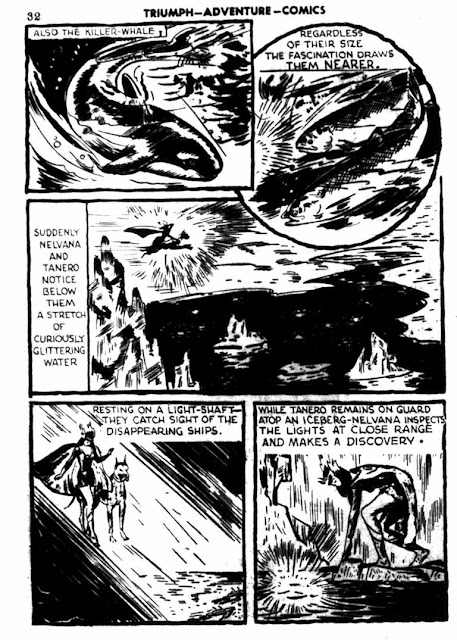Superhero
comics are so U.S.-centric that it’s easy to forget the genre
exerted international appeal. Our northern neighbors were rabid
consumers of US 4-color delights until WW2 put a damper on things.
In 1940 the Canadian Parliament invoked the War Exchange Conservation
Act which barred the importation and distribution of “nonessential
luxuries” like magazines and comics from the US. To fill this void,
Canadian publishers began to issue homegrown product. They were
partially hampered by restrictions on printing which forced them to
print their comics in black & white, although early on the covers
were 2-color. Eventually full color became the norm. Using the US
books as inspiration, the Canucks issued their own versions of
mystery men and in one case, a superheroine.
Nelvana
of the Northern Lights was the creation of cartoonist Adrian Dingle
and was inspired by the folklore of Inuit people. In their legends
there was a god named Koliak who mated with a human woman, producing
a daughter. In the legend the daughter is witch, replete with a hag
like appearance. For his comic. Dingle modified her into a beautiful
demi-god and made her a protector of humankind. She could fly "at
the speed of light", become invisible, shape-shift into ice
form, communicate telepathically and was immortal. She could also
summon powerful rays, able to melt metal and disrupt radio
communications.
In
a case of ‘great minds think alike”, south of the border William
Moulton Marston and H. G. Peters were concocting their own feminine
champion, Wonder Woman. Like Nelvana she was inspired by mythology,
but Koliak’s daughter beat Diana to the newsstand by three months.
Here
is her opening story from TRIUMPH ADVENTURE COMICS # 1.
For
the most part her adventures ran in a serial format over the course
of four multi-issue story arcs. These ran for the gamut of the
comic’s 31 issues, SUPER DUPER COMICS #3 and her own one-shot
comic.
By
the end of her run, in 1947, Nelvana took on an appearance similar to
Supergirl.
In
Canada the character is much beloved. So much so that in 1995 the
Canadian Postal Service issued a postage stamp based on her solo
comic!
Pat






















No comments:
Post a Comment